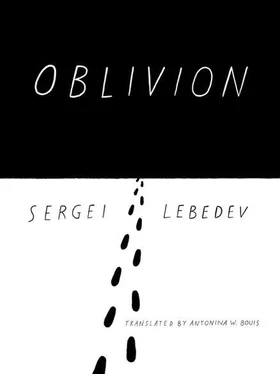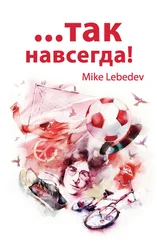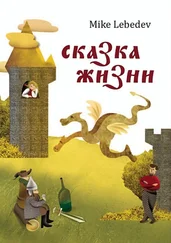The hospital was old, wooden, full of cracks; and mice began emerging out of the cracks. The wood of the walls and floors was so brittle that it was pointless to fill mouse holes with ground glass, and the mice ran sidling along walls and occasionally darted diagonally across the floor. But now, feeling something that people didn’t, the mice grew cold and came outside. They sniffed and ran around, they were chased with mops and rags, they brought in a cat, but the mice did not leave, and the cat got under the wardrobe and sat there, not afraid but as if he knew something, too. The mice climbed up the curtains, the legs of the beds, there were hundreds of them and it was suddenly clear that there were many more mice than people, this was their abode, and the hospital had rotted down to the last board; I imagined that mice were climbing out in all the other houses in the district, mice that had seen only old newspapers that lined the walls beneath the wallpaper and were now seeing the world.
Of course, the mice had been upset by the tanks, the noise chased them out of cracks and nests, but their exodus was an accurate reflection of people’s reaction: the nurses stopped struggling against the mice and tried to find something monotonous to do, but nothing worked: the mop end came off the mop, the water splashed, dishes fell from their hands. There was no anxiety or excessive concern in this: every action is a link in a chain extending from yesterday into tomorrow, and every action is given meaning by the proximity of other actions, proximity repeated and fixed in time; wash the floor, iron clothes, water flowers, take a temperature, give a shot—each action on an ordinary day exists in a series of others, in the outline of time moving in order, a series that imperceptibly supports you, does not let you feel that time is in the least benign, that midnight is breathing down the neck of noon, and that at every moment an internal light is extinguished.
That day time stopped for everyone; each was left with what was in his hand—a scalpel or a mop; no action became meaningless but it did become unclear in which greater time these actions were taking place—the past and present no longer gave a clear image of the near future.
The hospital was housed in a former estate; space opened up too generously from its windows, the view was meant for a park that had already been cut down, and now it seemed bizarre that the architect had decided to reveal all that emptiness lying in front of the grain fields, the emptiness now crowded with self-allotted garden plots: their fences were hammered together out of crooked planks, wrapped in wire used for fruit crates and scraps of barbed wire, reinforced with uneven sheets of rusted iron hanging so crookedly that they could have been thrown against the fence by a gust of wind; beyond the garden beds—and always in a corner—were windowless tool sheds just as sloppily constructed.
The egg-yellow hospital building with its two wings, four columns at the entrance, and tall windows—if all were opened, the house would splash out the foam of the curtains and become airy, swaying like a sailboat—shrank at the sight of the tanks beyond the gardens; it seemed as though the ceiling moved closer to my face.
The tanks left, and the garden allotments filled with people; someone started a bonfire, the smoke of rotting matter rose up, and in that smoke—it was a weekday, the gardens should have been deserted—men and women bustled around with shovels, not quite sure what to do: it was too early to dig up potatoes and the cucumbers had been harvested. Some were digging things out, others digging holes for compost, and it felt as if the tanks had awakened memories that they were too young to have; a little more and one of them would realize that he was digging a trench or a foxhole; the soft soil, worked for many years, seemed to be calling, offering shelter inside its womb. At first the shovel bayonets dug up dusty chunks, but then the moist interior was revealed, untouched by drought, embedded with thin, white, grass roots, and riddled with the pathways of worms and beetles.
There is something indecent in soil unearthed by a shovel, in its friability, as if it were black farmer’s cheese, black buttermilk from a black cow; in its formlessness, readiness to fall apart—and in the cold wet grasp of its chunks clinging to a boot. I once saw flooded tank trenches in the woods, filled with impenetrable water, oily as overbrewed tea, which had absorbed rotting aspen leaves, year after year, until they dissolved; the water was a deadly infusion as deep as a coma, and in the midst of the clear leafy forest full of sunny glancing light, each trench was like a death cup filled with the earth’s juices.
People were striving to reach that dissolving blackness, its shelter; the village was emptying, the garden plots filling up, as if the residents had smelled the diesel fuel of the tanks, the smell of war and disaster, and were leaving their houses and everything that meant their ordinary lives—to temporary shelter by the garden plots.
The ambulatory patients understood that the medical strictures were suspended for the moment and also headed out to the gardens; they walked cautiously, attuned to their diseases, trying to catch the secret signals, hear the flaw in their heartbeat, the additional twist in the rhythm caused by the illness; the illness hid itself, and the patients tried to find it, to see how far it had spread, which territories it occupied; the patients stretched their necks, straightened up and stood on one leg, in an unstable position, so that fundamental support would not hinder the perception of what can be perceived only in nonequilibrium, in turning yourself into the fine needle of a recorder that registers the quakes of the earth’s core unfelt by humans.
However, an observer would not need to search for the illness, so clearly evident was it in their faces and figures. What I saw was beyond the limits of ugly and repulsive; freed of aesthetic significance, it was a sculpture, a plastic picture of what life can do to people if they don’t have inner changes that give them the strength to withstand it and not give in.
Bulging bellies, sunken cheeks, drooping breasts, paralyzed arms—the injuries were so varied that they read as monotony. The hospital, a sorrowful house, gathered all possible traumas; but the missing fingers chopped off by an ax, or a leg severed by a train were just the visible extremes among them; the general human figure suggested that people lived in a concentration of constant pressure in different directions, which broke, bent, sprained, and twisted them; people were crushed, pushed, stretched, they expended labor and exhausted themselves in effort, and now when they couldn’t hammer in a nail without clutching their hearts or falling into a coughing fit, it turned out that the labor had not strengthened them internally. People were used to the form created by the pressure; and when the pressure vanished and a long pause ensued, a rarefication of time—then people walked as if they had forgotten how to walk unaided.
Sick and healthy—everyone gathered at the garden plots, trestle beds were quickly covered in newspapers and the vodka appeared; someone had brought a battery-powered radio and a television and people clustered around them, no one tried to leave, or follow the tanks, or take part in anything—they all watched the TV or stared at the woods, beyond which the plane engines at the military air base warmed up, and there was the sense that the television and the radio were the latest secret mechanisms that decided destiny, pronouncing a verdict calculated by tubes and micro schematics: what would be, what would not.
In was during this pause, this general stupefaction that Grandfather II’s life ended; it wasn’t that no one risked driving him to Moscow—for a brief period all human duty was suspended and people even tried not to pick up the phone, for who knew what the call might bring; the ambulance carrying medicine for him got stuck on the side of the road, letting the tanks go by, and he died—the new era might have accepted him, but it was the interval, the disconnect, that killed him.
Читать дальше












